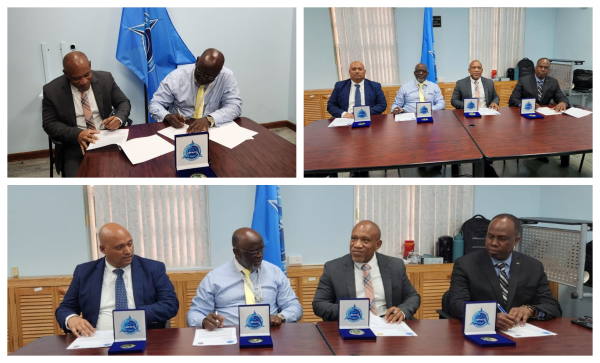~Letter of intent confirms close collaboration and shared responsibility for security in the Caribbean.~
 BRIDGETOWN, BARBADOS:--- Caribbean countries share a lot: a common history, a rich culture and a deep sense of connectedness. They also face shared challenges: persistent gun violence, vulnerability to cyberattacks, and the threat of transnational organized crime. That is why regional cooperation is of vital importance.
BRIDGETOWN, BARBADOS:--- Caribbean countries share a lot: a common history, a rich culture and a deep sense of connectedness. They also face shared challenges: persistent gun violence, vulnerability to cyberattacks, and the threat of transnational organized crime. That is why regional cooperation is of vital importance.
Last week this cooperation was visibly reinforced: the Chief of Police of the Sint Maarten Police Force, Commissioner Carl John, the Chief of Police of the Curaçao Police Force, Commissioner Raymond Ellis and the Chief of Police of the Caribbean Netherlands Police Force, Commissioner Alwyn Braaf, signed – in coordination with their responsible ministers – together with Lt. Col. Michael Jones, Executive Director of CARICOM IMPACS, a letter of intent further strengthening their ties. Jones has long emphasized the need for regional cooperation and stated earlier: ‘The devastating impact of illegal guns in the Caribbean cannot be overstated. Only together can we counter this threat and build safer societies for our people.’
The cooperation does not remain on paper. In June, a five-day forensic training was held in Sint Maarten in collaboration with the Trinidad and Tobago Forensic Science Centre. In September, a new training will follow, this time focused on organized crime and firearms. Steps are also being taken in the field of cybercrime. The Cybercrime Fusion Center in Barbados is supporting the countries in strengthening their digital resilience. In addition, this cooperation will make an important contribution to tackling gun violence, migrant smuggling and human trafficking in the region.
A central element in the agreements is the importance of information sharing. Whether it concerns forensic expertise, digital threats, or cross-border crime: by exchanging data, signals, and analyses, the countries increase their joint effectiveness. For example, the countries will start sharing their watchlists, making it much harder for criminals to move freely across the region. Crucial in this process is timely feedback, enabling the next country to anticipate the arrival of incoming offenders.
During their visit to Barbados, the Police Chiefs were introduced to the facilities of CARICOM IMPACS. They exchanged experiences about their own forces and discussed the cooperation they already maintain within the Board of Chiefs of Police. This existing collaboration provides a solid foundation to build upon.
The role of police leaders from the Caribbean part of the Kingdom in the wider region is visibly growing. For instance, the Chief of Police of Sint Maarten was recently elected First Vice President of the Association of Caribbean Commissioners of Police (ACCP), a recognition of the contribution the Kingdom’s countries make to the regional security structure.
The Caribbean countries are young, but their cooperation is developing rapidly. The letter of intent underscores the shared conviction that only through joint commitment, practical arrangements and intensive information sharing can the region become more resilient against violence, cyberthreats and organized crime. Since last week, a concrete contribution has thus been made to a safer Caribbean region.









